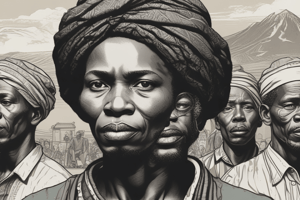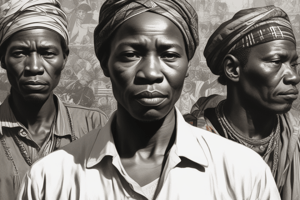Podcast
Questions and Answers
What was apartheid?
What was apartheid?
A system of institutionalized racial segregation in South Africa and South West Africa (now Namibia) from 1948 to the early 1990s.
What was the political culture associated with apartheid?
What was the political culture associated with apartheid?
An authoritarian political culture based on baasskap (boss-hood or boss-ship).
Who were the dominant minority population in South Africa during apartheid?
Who were the dominant minority population in South Africa during apartheid?
The white population.
What were the social stratifications under apartheid?
What were the social stratifications under apartheid?
What are the present-day effects of apartheid?
What are the present-day effects of apartheid?
Flashcards are hidden until you start studying
Study Notes
Apartheid Explained
- Apartheid was a system of institutionalized racial segregation and discrimination in South Africa from 1948 to 1994.
Political Culture
- The political culture associated with apartheid was characterized by a strong nationalist and authoritarian ideology, which emphasized white supremacy and racial segregation.
Dominant Minority Population
- The dominant minority population in South Africa during apartheid were the Afrikaners, a group of white South Africans of Dutch, French, and German descent.
Social Stratifications
- Under apartheid, South Africa was divided into four racial groups: Whites, Blacks, Coloreds, and Indians, each with different rights and restrictions.
- Whites held the highest social status, while Blacks were subjected to forced segregation, economic exploitation, and political oppression.
- Coloreds and Indians were considered intermediate groups, with Coloreds being people of mixed race and Indians being immigrants from India.
Present-Day Effects of Apartheid
- The legacy of apartheid continues to impact South African society, with ongoing issues of racial and economic inequality, poverty, and social injustice.
- The effects of apartheid have led to a significant wealth gap between whites and blacks, with whites continuing to dominate the economy and hold significant political power.
- Apartheid's legacy also includes ongoing social and political tensions, as well as efforts towards reconciliation and transformation.
Studying That Suits You
Use AI to generate personalized quizzes and flashcards to suit your learning preferences.




